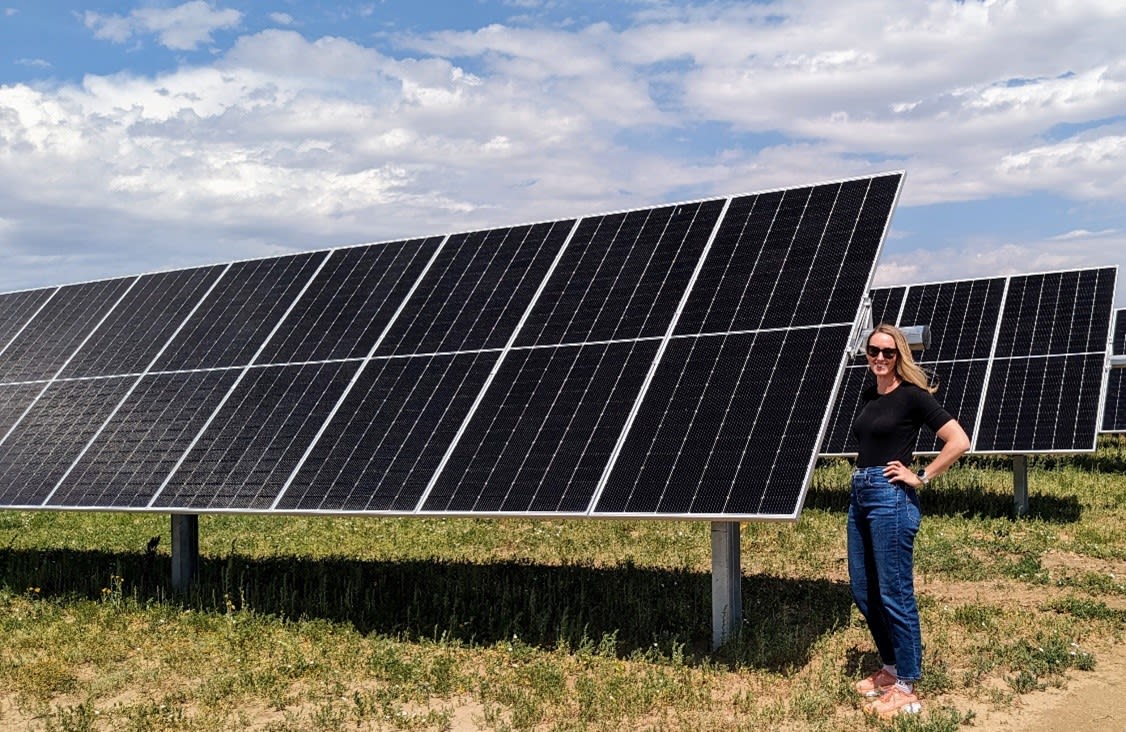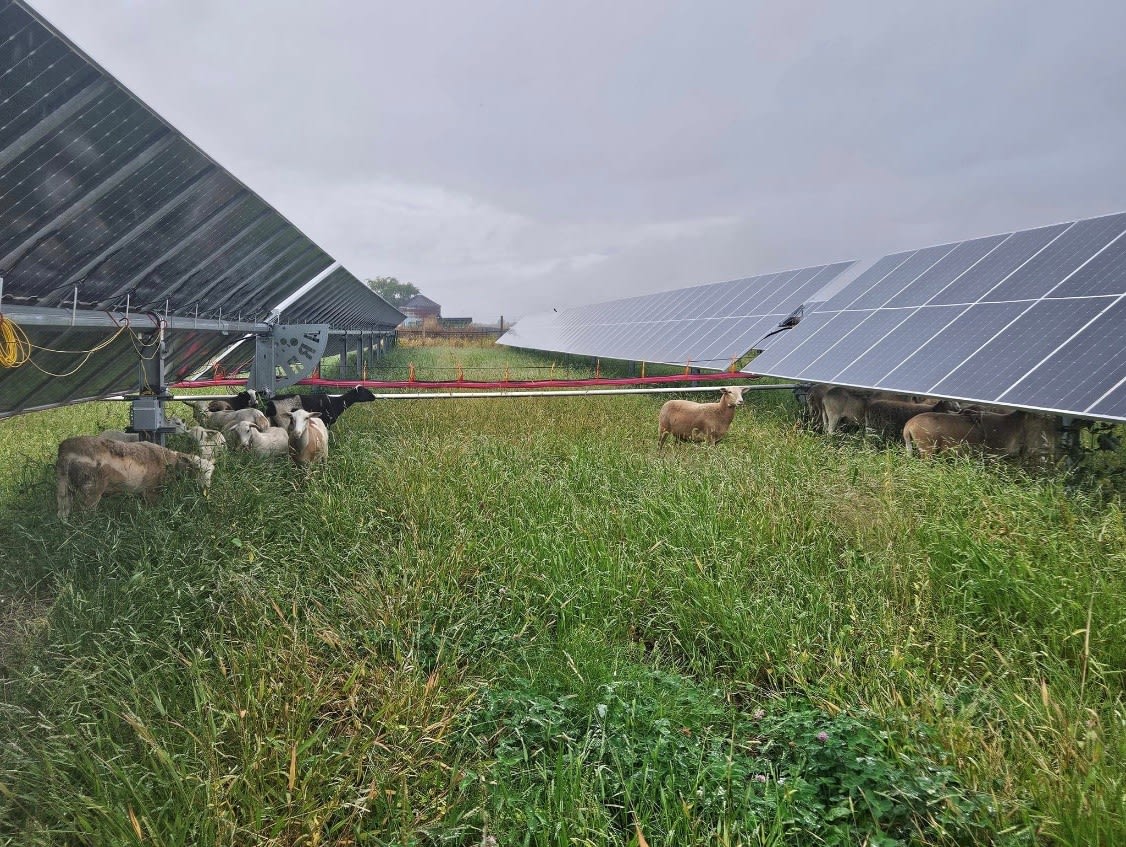Responsible Renewables Series: Empowering Communities Through Purpose-Driven Solar Development
This blog is part of our series spotlighting leaders in the pursuit and development of Responsible Renewables projects. This series is being hosted in collaboration with Schneider Electric and Korn Ferry. For a background on responsible renewables, we encourage you to start with the introductory blog, which explores the issues and opportunities.
In our latest installment of the Responsible Renewables series, we zoom in on Pivot Energy a renewable energy provider and independent power producer that develops, finances, builds, owns, and manages solar and energy storage projects. Pivot Energy is actively developing 1,000 solar projects in over one hundred communities across 14 states.
 We were excited to speak with Annie Lappé, Vice President of Strategy and Impact at Pivot Energy, who shares insights into the company's unique approach to developing distributed generation projects. As the driving force behind Pivot Energy Energy's responsible community and environmental impact acceleration, Annie leads the company's ambitions to embed social and environmental stewardship into all facets of the development, including community engagement, community investment, and impactful initiatives across its markets. Continue reading to learn how Pivot Energy sets itself apart in the industry, including the company's journey, partnerships, and the crucial role of #education and collaboration in advancing the clean energy transition.
We were excited to speak with Annie Lappé, Vice President of Strategy and Impact at Pivot Energy, who shares insights into the company's unique approach to developing distributed generation projects. As the driving force behind Pivot Energy Energy's responsible community and environmental impact acceleration, Annie leads the company's ambitions to embed social and environmental stewardship into all facets of the development, including community engagement, community investment, and impactful initiatives across its markets. Continue reading to learn how Pivot Energy sets itself apart in the industry, including the company's journey, partnerships, and the crucial role of #education and collaboration in advancing the clean energy transition.

Annie Lappé in Aurora, Colorado, called "Kacie Peter's Garden"
to commemorate our former colleague, Kacie Peters.
What makes Pivot Energy unique in the solar industry?
Annie Lappé: Pivot Energy is a purpose-driven renewable energy (or distributed energy company) committed to delivering high-impact projects to the communities where we operate. As a certified B Corporation, we prioritize environmental stewardship, social impact, and purpose-driven solar development. We focus on developing projects in high-emission communities to decarbonize the areas that need it most (sometimes referred to as “high emissionality projects”). Pivot Energy also invests in social impact initiatives and is committed to strong land stewardship approaches on our projects.
"At Pivot Energy, we are committed to a purpose-driven solar development approach that delivers meaningful social and environmental impact to the communities where we develop and operate solar projects. We are excited to share our learnings with the many corporations that want to move towards a high-impact renewable energy procurement approach."
Could you explain what being a B Corp means for Pivot Energy and how it aligns with your goals?
Annie Lappé: As a B Corp, we balance the objectives of profit, people, and the planet, demonstrating a triple-bottom-line approach. We are dedicated to embedding social and environmental impact into our project development process and have internal Environmental, Social, and Governance commitments, all of which help us build a more sustainable and impactful company.
How has your role at Pivot Energy evolved, and what specific initiatives have you been working on?
Annie Lappé: When I joined Pivot Energy, I worked with our team to evaluate our project development process against “high-impact frameworks” such as the Purpose-Driven Toolkit from The Nature Conservancy & Rivian and the Beyond the Megawatt Principles from CEBA, to understand where we were already driving positive environmental and social impact, and where we could improve. After our internal analysis and external data gathering of what could naturally fit into our north star, we developed a three-year ESG roadmap to ensure best-in-class, high-impact, community-centric development. Currently, we're in the implementation phase, prioritizing diversifying our supplier network, driving more social impact through greater community investment, and deepening our agrivoltaics offerings, such as piloting crop production under our sites, all to maximize the co-benefits of our projects.
Tell us more about Pivot Energy's community engagement and investment commitments.
Annie Lappé: Our goal is to supercharge our environmental and social impact efforts. We are deeply committed to robust community engagement, seeking input from community members to guide our investment commitment. Our social impact pillars include reducing energy burden for low-income families, creating workforce pathways into the solar industry for local residents, supporting land stewardship practices and strengthening rural economies. We have donated $1,200,000 to local initiatives and pledged millions more for community impact initiatives.
Sheep helping to maintain proper vegetation height under
the panels at a 2MWac project in Kankakee County, Illinois.
How does education contribute to your projects and in addressing community concerns?
Annie Lappé: We aim to educate communities about the benefits of solar and address concerns related to project aesthetics and safety. We actively engage in trade associations, policy efforts, and local community meetings to listen to, receive feedback and speak with community members. Unfortunately, there is a lot of frustration with, or misinformation about, clean energy development. It’s our responsibility as developers to meet community members where they are and have honest conversations about solar development.
What partnership are you proud of that exemplifies Pivot Energy's commitment to high-impact development?
Annie Lappé: We recently announced that we will develop up to 500 megawatts of community-centric solar projects in over 100 local communities. There are four main impact goals we are focused on within this collaboration: 1) diversifying our contractors to work with more BIPOC, LGBTQ, women, and veteran-owned businesses; 2) investing in workforce training to bring BIPOC, LGBTQ, women, and veterans into the solar workforce; 3) supporting environmental justice initiatives at the local and state levels; and, 4) serving more low-income customers with higher discount rates in our community solar projects. These types of partnerships align with our mission to move the U.S. to a more equitable, sustainable, and distributed energy system.
What are the opportunities for corporate partnerships with Pivot Energy, and what does a successful partnership look like?
Annie Lappé: We welcome partnerships with corporations that share our vision of an equitable, sustainable, and distributed grid. We can customize offerings to help corporations meet their carbon reduction, ESG, or renewable energy goals. We are eager to share our views about and experience developing impactful solar projects with companies looking to meet their renewable energy procurement goals. We believe that collaboration and shared commitment can create best-in-class projects that provide meaningful benefits to these communities and help us fight climate change.

Sheep helping to maintain proper vegetation height under
the panels at a 2MWac project in Putnam County, Illinois.
Final thoughts
Annie's insights not only highlight the impressive strides made by Pivot Energy but also underscore the critical need for collaboration and education in advancing responsible renewable energy solutions. As the industry evolves, corporate partnerships showcase the power of aligning values for broader impact. With a focus on high-caliber community-centric approaches and sustainable practices, Pivot Energy exemplifies the potential for companies to drive positive change while achieving renewable energy goals.
.
Subscribe to our mailing list to join us as we expand on the topic of responsible renewables in a blog series that will feature conversations shaping the future of responsible renewables. Each month, we will publish a new blog spotlighting another important voice working to address responsible renewables, including developers, corporate buyers, community members, and NGOs.
